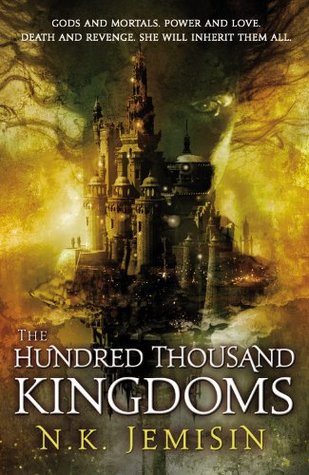A paranormal romance in which the heroine is not an idiot,
or
A book that raises fascinating questions about power, sex, theology, race, and slavery – and answers none of them,
or
Does it count as deus ex machina if the deus in question is (spoiler) the main character?
An ancient war between the gods left the Amn people in charge of four godly prisoners of war. Turns out that enslaved gods make the ultimate weapon, and now the Amn rule the world. (And it’s not a coincidence that Amn sounds like Aryan. They’re described as bone-white in the book and they’re overly concerned with ethnic purity.)
Yeine Darr, the mixed-race granddaughter of the current king of the world, gets summoned to the court where she receives surprising news: the king’s throwing her into the succession contest along with her cousins. Meanwhile Nahadoth, one of the enslaved gods, takes a shine to her. Two cousins who want to murder her and unwanted advances from a billions-year-old chaos god? Yeine must navigate this nightmare.
Just for the fact that it’s something different, I would say bravo to the romance aspect of this book. Yeine possesses a lot more self-awareness than other paranormal romance heroines I’ve read. She knows the difference between lust and love and knows full well that sex with Nahadoth could fry her brains out. She carefully ponders that risk. Jemisin indulges in some Meyeresque prose sometimes – she’s fond of taut moments and bitter looks – and Nahadoth wants Yeine because she’s special, not because of anything Yeine did. On the other hand, there’s a damn good plot reason Yeine is so special.
The politics side of the book left me wanting so much more. For one thing, I want to know how the ruling family of the Amn managed to stay in power for two thousand years straight. We get to see the current nobility guilty of slavery, rape, sex slavery, child sex slavery, religious persecution, torture, mutilation, cannibalism, incest, and alcoholism. That’s an interesting exploration of what two thousand years of absolute power will do to you. But in all that time, there was nobody insane enough to use the god-weapons to destroy the entire planet? Everybody hates the rulers, so I would at least think that failed rebellions would ruin the world’s economy.
Here are just a few of the questions that the Hundred Thousand Kingdoms raises: If your slaves are insane, do you dare set them free? What happens if you engineer a zombie plague that only kills commoners? (That one could have been an entire book.) Is Nahadoth responsible for his actions? Is Yeine Amn or Darre? Is Amn an ethnicity or an attitude? Is brutality to save one’s own people ever justified? Is Yeine ever justified in commanding the enslaved gods?
Are the Darre people any better than the Amn? Yeine accuses the Amn of being barbarians, just the barbarians with the most toys. If the Darre had control of the enslaved gods, what kind of people would the Darre become? The Darre are prejudiced against men and they have a habit of kidnapping and mutilating their neighbors. They earned their enemies. But they didn’t earn the annihilation Yeine’s cousin threatens to deal out to them.
But no, none of these questions get addressed. Yeine just (spoiler) becomes a goddess and fixes everything to her satisfaction. Which includes letting Nahadoth torture one of her cousins. Both Yeine and Nahadoth are forced to do horrible things over the course of the book, but the ending implies that neither of them are going to face any consequences for them.
I enjoyed the book. It’s gripping and I devoured it in a few days. But I really, really wanted it to be Game of Thrones with enslaved gods added and it’s not. It’s foremost a romance novel that happens to have tantalizing political asides.

